Sending your Child to Daycare
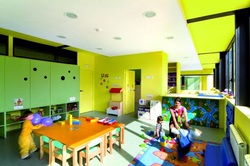
While Lucas is not a "Daycare Baby", I have a lot of experience in Child care as I worked at two different Daycares over a period of two years. One was a small, family-like environment, and the other was a large, classroom-like environment. I have experience in caring for Daycare Kids from infancy through Pre-K, and have also worked two Summer Camp with ages Kindergarten through 5th grade, as well as headed a morning Latchkey program with kids in Kindergarten through 8th grade.
My aim here is to help parents understand what your child's life is like when they are at Daycare, and how you can make the transition into Daycare life easier on you, your baby, and the daycare employees.
My aim here is to help parents understand what your child's life is like when they are at Daycare, and how you can make the transition into Daycare life easier on you, your baby, and the daycare employees.
Get to know your Child's Care-Takers
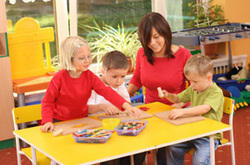
It's easy for parents to forget how much time their babies spend with Daycare providers. For 8 to 10 hours a day, the men and women at Daycare are all your kids know. Almost all of the "teachers" at daycare grow to truly love your child, and want what's best for him or her. While they are not the parents, they spend as much time (or sometime more!) with your child as you do!
Speaking from experience, it's much easier to take care of a child when you know more about them. I would make every effort to get to know my kids and their parents. If I knew that a parent wanted their child to come to a loving, caring, supportive environment, I would take time out of my day to give that child extra hugs, and snuggles. On the other hand, if a parent expressed that Daycare was just "School" for their child, I would take time to push them academically, and focus more on teaching.
When I worked in the large daycare, which was second-home to about 350 kids, there were many times when a parent would come to pick up their child, and not even know my name. This saddened me more than they would ever know. I don't understand how a person could send their child to a place and not even take the time to learn the names of the people who were helping raise them!
On the other hand, there were parents who were kind and compassionate to me. They got to know me, and learned details like my husband's name, my hobbies, and even which kind of baked treats were my favorite! I appreciated these parents because I knew that they loved their children, and understood how much I cared for them, too.
What many parents don't know about Daycare Teachers is their pay. You assume that because Daycare is so expensive, that the employees there are being well-paid for their work, but unfortunately this isn't the case. Daycare has a lot of overhead costs such as food, learning materials, and classroom maintenance, so in the end, there's not much left over to spoil the employees. The vast majority of Daycare Teachers only make minimum wage, as I did at both of the Daycares where I worked. So when it really comes down to it, most Daycare Teachers aren't there for the money, they're there because they love children and want to aid in their development.
Speaking from experience, it's much easier to take care of a child when you know more about them. I would make every effort to get to know my kids and their parents. If I knew that a parent wanted their child to come to a loving, caring, supportive environment, I would take time out of my day to give that child extra hugs, and snuggles. On the other hand, if a parent expressed that Daycare was just "School" for their child, I would take time to push them academically, and focus more on teaching.
When I worked in the large daycare, which was second-home to about 350 kids, there were many times when a parent would come to pick up their child, and not even know my name. This saddened me more than they would ever know. I don't understand how a person could send their child to a place and not even take the time to learn the names of the people who were helping raise them!
On the other hand, there were parents who were kind and compassionate to me. They got to know me, and learned details like my husband's name, my hobbies, and even which kind of baked treats were my favorite! I appreciated these parents because I knew that they loved their children, and understood how much I cared for them, too.
What many parents don't know about Daycare Teachers is their pay. You assume that because Daycare is so expensive, that the employees there are being well-paid for their work, but unfortunately this isn't the case. Daycare has a lot of overhead costs such as food, learning materials, and classroom maintenance, so in the end, there's not much left over to spoil the employees. The vast majority of Daycare Teachers only make minimum wage, as I did at both of the Daycares where I worked. So when it really comes down to it, most Daycare Teachers aren't there for the money, they're there because they love children and want to aid in their development.
Label Anything you want back!
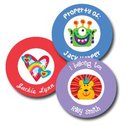
Whether you send your child to a large or small Daycare, there is a LOT of stuff that comes and goes. From bottles and sippy cups to extra clothes, shoes, and coats, kids come with a lot of baggage (quite literally)! If there is any particular item that your child takes to daycare that you don't want mixed-up, misplaced, or used by someone else, please label it.
There are a ton of sites that offer custom label printing, but I highly suggest Inchbug. Their products are very high quality, durable, and also affordable. They make just about every kind of label that you can possibly imagine, from silicone bands to microwave, dishwasher, and freezer-safe adhesive stickers. You can customize labels with your child's name and picture, or choose from a variety of cheerful colors and clip-art. These labels are great for cups, bottles, shoes, and more!
For items that are difficult to label with stickers, just bust out a Sharpie and write your child's name inside. If you are concerned about ruling out hand-me-downs by permanently labeling clothes or items with your child's name, try sew-in labels as an alternative.Be cautious of only using initials, as there may kids with the same ones as your child. Masking tape also makes an easily-removed temporary label for things that aren't going to come-and-go with your child on a daily basis.
Don't forget to label items that stay at daycare, too. Many states have laws that require stuff like Butt Paste, wipes bins, medicine, and baby food be labeled with your child's first and last name, along with the date.
There are a ton of sites that offer custom label printing, but I highly suggest Inchbug. Their products are very high quality, durable, and also affordable. They make just about every kind of label that you can possibly imagine, from silicone bands to microwave, dishwasher, and freezer-safe adhesive stickers. You can customize labels with your child's name and picture, or choose from a variety of cheerful colors and clip-art. These labels are great for cups, bottles, shoes, and more!
For items that are difficult to label with stickers, just bust out a Sharpie and write your child's name inside. If you are concerned about ruling out hand-me-downs by permanently labeling clothes or items with your child's name, try sew-in labels as an alternative.Be cautious of only using initials, as there may kids with the same ones as your child. Masking tape also makes an easily-removed temporary label for things that aren't going to come-and-go with your child on a daily basis.
Don't forget to label items that stay at daycare, too. Many states have laws that require stuff like Butt Paste, wipes bins, medicine, and baby food be labeled with your child's first and last name, along with the date.
If your kid is sick, Keep them home!
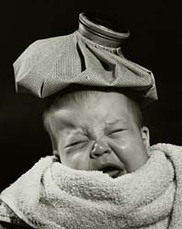
We Daycare providers understand that kids get sick, but often times it comes as a result of your child being around someone else that is sick. Be it a family member, friend, or a trip to a germ-infested store, the illness had to come from somewhere.
If your child is sick, especially with a contagious bacteria, please, please, please just keep them home. I understand that it's difficult to take off work, and that some places of employment are not understanding of a parents' needs, but for the safety of the other children, their families, and the Teachers, please do your best to keep them home.
Imagine how difficult it is for you to stay home with your sick child... you have to care for them, comfort them, and ensure that they receive adequate amounts of fluid and rest. Now, imagine doing that with four or more other children running around, while trying to create a conducive learning environment for them, and making an attempt to keep them away from the sick child. Then, a teacher has to work to constantly clean and sanitize the ENTIRE classroom to prevent further spread of the illness. Remember that it is the job of your child's daycare provider to care for all of the children in his or her classroom, and that they are legally obligated to provide each of them with a safe and happy learning environment. Adding a sick child to the equation can complicate things immensely, and prevent them from being able to do their job, which is to care for your child, as well as the children of others.
If your child is sick, especially with a contagious bacteria, please, please, please just keep them home. I understand that it's difficult to take off work, and that some places of employment are not understanding of a parents' needs, but for the safety of the other children, their families, and the Teachers, please do your best to keep them home.
Imagine how difficult it is for you to stay home with your sick child... you have to care for them, comfort them, and ensure that they receive adequate amounts of fluid and rest. Now, imagine doing that with four or more other children running around, while trying to create a conducive learning environment for them, and making an attempt to keep them away from the sick child. Then, a teacher has to work to constantly clean and sanitize the ENTIRE classroom to prevent further spread of the illness. Remember that it is the job of your child's daycare provider to care for all of the children in his or her classroom, and that they are legally obligated to provide each of them with a safe and happy learning environment. Adding a sick child to the equation can complicate things immensely, and prevent them from being able to do their job, which is to care for your child, as well as the children of others.
Communicate about discipline techniques
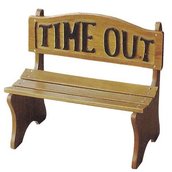
Discipline is one of the most important parts of a child's day. Your daycare provider should have a specific policy on discipline. Whether it's the Responsible Thinking Process method, good old fashioned time out, or problem-prevention techniques, you should know what's going on when you're not there.
The best-case scenario is that your family practices the same discipline techniques at home and at Daycare. This can be achieved in several ways: first, finding out what your Daycare does, and practice it at home. Second, getting your Childcare provider on-board with your at-home techniques, by asking them to use it at school, and third, a combination of the two methods.
Children are very concrete beings. Simple things like calling an object or action by two names can be confusing. Granted, children are great at compartmentalizing ideas, but avoiding confusion is best. If you call the discipline location the "Thinking Spot" or "Time Out" at home, encourage your Daycare to do the same, or vice-verse. It will make discipline easier on you and your child, especially at young ages. While children will quickly learn that School calls it "The Thinking Spot" and mommy calls it "The Time Out Bench", it's punishment for doing something wrong in either location.
Developing a consistent method for disciplining your child is absolutely essential. Whether it's one warning before punishment, or a 1-2-3 method, pick something and stick to it. Learning how your child is disciplined at school can be very helpful, and talking to their Teacher is the best first-step to setting a process that works.
The best-case scenario is that your family practices the same discipline techniques at home and at Daycare. This can be achieved in several ways: first, finding out what your Daycare does, and practice it at home. Second, getting your Childcare provider on-board with your at-home techniques, by asking them to use it at school, and third, a combination of the two methods.
Children are very concrete beings. Simple things like calling an object or action by two names can be confusing. Granted, children are great at compartmentalizing ideas, but avoiding confusion is best. If you call the discipline location the "Thinking Spot" or "Time Out" at home, encourage your Daycare to do the same, or vice-verse. It will make discipline easier on you and your child, especially at young ages. While children will quickly learn that School calls it "The Thinking Spot" and mommy calls it "The Time Out Bench", it's punishment for doing something wrong in either location.
Developing a consistent method for disciplining your child is absolutely essential. Whether it's one warning before punishment, or a 1-2-3 method, pick something and stick to it. Learning how your child is disciplined at school can be very helpful, and talking to their Teacher is the best first-step to setting a process that works.
Dealing with Special Food Needs

Whether it's due to allergies, personal beliefs, or financial reasons, a good Daycare should be incredibly sensitive to your child's specific food needs. But what must be understood is that parents and Daycare providers must work together to ensure that these requirements are met. Identifying a child's needs is the first step to this process.
If your child has allergies, whether mild or severe, make sure that your Daycare provider is made aware. Type up a list of foods that your child cannot have, and laminate it or place it in a protective sheet cover, and give it to your child's teacher. This will ensure that your little one won't be given something that will cause an allergic reaction. If your child has a severe allergy or can be affected by air-borne particles, make sure that the adviser of the Daycare facility is made aware, and that it is clearly posted throughout the center.
If your child goes to a daycare that has a food plan, be sure to take the time to look over the menu in detail, and identify any items that are not suitable for your child. Many Daycares offer an alternative menu for children with special food needs, and if you're unsure if this is an option, it doesn't hurt to ask. If another choice is not available from your childcare provider, don't forget to send food to school with your child. Make sure to label and date the contents, and give the Teacher a little reminder note about the change in menu, along with serving instructions (such as heating directions).
If your child is lactose intolerant, or you prefer that they receive Organic milk, please make sure that they are always stocked-up, and that their personal stash is labeled with their name and the date that it was purchased. Same thing goes for any snacks or special food that is left at Daycare and not transferred home each night.
If your child is still being introduced to new foods, be sure to provide an up-to-date list of foods that are safe for your baby to eat. Many infant rooms provide food for the babies, and knowing which ones have already been introduced can prevent monotony at mealtime, and ensure that your child is receiving the proper amount of nutrients.
If your child has allergies, whether mild or severe, make sure that your Daycare provider is made aware. Type up a list of foods that your child cannot have, and laminate it or place it in a protective sheet cover, and give it to your child's teacher. This will ensure that your little one won't be given something that will cause an allergic reaction. If your child has a severe allergy or can be affected by air-borne particles, make sure that the adviser of the Daycare facility is made aware, and that it is clearly posted throughout the center.
If your child goes to a daycare that has a food plan, be sure to take the time to look over the menu in detail, and identify any items that are not suitable for your child. Many Daycares offer an alternative menu for children with special food needs, and if you're unsure if this is an option, it doesn't hurt to ask. If another choice is not available from your childcare provider, don't forget to send food to school with your child. Make sure to label and date the contents, and give the Teacher a little reminder note about the change in menu, along with serving instructions (such as heating directions).
If your child is lactose intolerant, or you prefer that they receive Organic milk, please make sure that they are always stocked-up, and that their personal stash is labeled with their name and the date that it was purchased. Same thing goes for any snacks or special food that is left at Daycare and not transferred home each night.
If your child is still being introduced to new foods, be sure to provide an up-to-date list of foods that are safe for your baby to eat. Many infant rooms provide food for the babies, and knowing which ones have already been introduced can prevent monotony at mealtime, and ensure that your child is receiving the proper amount of nutrients.
Respect State Laws and Rules of the Establishment

As a parent myself, I know that life can get hectic sometimes. Taking your child to Daycare is supposed to simplify things, not make them more difficult. But when you're searching for an acceptable daycare for your children, take some time to read over the rules of the establishment, and familiarize yourself with the laws that your particular state has in place. While you do get to choose which daycare or early learning facility most agrees with your personal perspective, you do not get to choose which laws you (and your daycare!) must abide by.
Michigan has plenty of laws in place with regard to child care. You can read all of them in the Licensing Rules for Child Care Centers, provided by the Department of Human Services (DHS), but I thought I'd highlight a few of the important ones (from both a parent and former daycare employee perspective). As per Michigan law, children are broken down into specified groups based on their age from Infant (birth to 11 months), Young Toddler (12 to 29 months), Older Toddler (30 to 35 months), and School-age (kindergarten and older). Most daycares also add a "pre-school" age, which includes children from 36 months through kindergarten.
Here are a few tidbits of information that I'd like to share from Michigan Laws:
1. Know which classroom your child belongs in, and be happy with it.
As a daycare teacher, I saw many parents who tried to dictate which classroom their child was in. They attempted to convince the owner's into letting their child move to the next classroom because they felt their little one was "ahead" academically or developmentally. I even had parents who wanted their child advanced because he or she would otherwise be "left behind" by their friends. Ultimately, it is not up to the parent OR the owners of the daycare to decide that a child is ready to move to the "next" classroom at a center, it is purely based on the law, which is dictated by age.
2. Understand how many care givers are required to care for your child, and the importance of a consistent schedule.
The most difficult law to understand is the child-to-caregiver ratio, which is also based on age. Michigan law states that at least 2 staff members, 1 of whom is a caregiver, shall be present at all times when at least 3 children between the ages of birth and 3 years of age are present. For infants and young toddlers, there shall be 1 caregiver for every 4 children and in the case of older toddlers, there shall be 1 caregiver for every 8 children. For children 3 years of age, there shall be 1 caregiver for every 10 children, and 1 caregiver for every 12 children who are age 4. If there are children of mixed ages in the same room or in a well-defined space, then the ratio shall be determined by the age of the youngest child.
What this basically all breaks down to, is that your daycare provider must examine the number of children in a room at any given point in time, and ensure that there is adequate staff for those children. In that, most daycare providers use your child's "common" drop-off and pick-up times to determine the schedule for its employees. Which means, if you are early dropping your kid off, late picking them up, or rearrange their daycare days (if you are part-time), then a change in staff is also required. If you are going to make a change to your child's schedule, and can help it, please give your daycare provider a heads-up. It will make everyone happier, and allow your child's teachers to provide them with the care that they deserve.
3. Learn your daycare's policy on nap time and sleeping equipment.
Michigan state law states that the center shall provide a cot or a mat constructed of a fabric or plastic which is easily cleanable for any child who is less than school-age and enrolled for 5 or more continuous hours in a day, or upon a parent’s request for any child in attendance. Additionally, the center must provide a sheet or blanket that is appropriately sized for your child. The center must also provide a nap time or quiet time for all under school-aged children who are enrolled for more than 5 consecutive hours, and opportunities to rest for children less than 3 years of age regardless of the number of hours in care. While the law states that infants may be fed and sleep as needed, it prohibits infants and toddlers from having bottles in or on sleeping equipment.
Now, from my experience, about 98% of parents choose to bring their own blankets, rather than use the center-provided ones. Speaking as a daycare employee, I can assure you that the blankets that I provided for children were clean, and only used by one person before they were washed and sanitized. But one word of advice: if you supply your own blankets, PLEASE make sure you take them home to wash them at least once a week, and also whenever your child soils them.
4. Approach questions about rules in a kind and understanding manner.
Most importantly, you have to be comfortable with the decision you've made to send your child to daycare. If you feel that something is awry, or that your child is not receiving adequate care, talk to their teachers. Try to approach the situation logically, and without accusation. Sometimes what you may see as less-than-desirable decisions may not be the fault of individual teachers as much as it is the caretakers following the law or rules of the establishment.
Michigan has plenty of laws in place with regard to child care. You can read all of them in the Licensing Rules for Child Care Centers, provided by the Department of Human Services (DHS), but I thought I'd highlight a few of the important ones (from both a parent and former daycare employee perspective). As per Michigan law, children are broken down into specified groups based on their age from Infant (birth to 11 months), Young Toddler (12 to 29 months), Older Toddler (30 to 35 months), and School-age (kindergarten and older). Most daycares also add a "pre-school" age, which includes children from 36 months through kindergarten.
Here are a few tidbits of information that I'd like to share from Michigan Laws:
1. Know which classroom your child belongs in, and be happy with it.
As a daycare teacher, I saw many parents who tried to dictate which classroom their child was in. They attempted to convince the owner's into letting their child move to the next classroom because they felt their little one was "ahead" academically or developmentally. I even had parents who wanted their child advanced because he or she would otherwise be "left behind" by their friends. Ultimately, it is not up to the parent OR the owners of the daycare to decide that a child is ready to move to the "next" classroom at a center, it is purely based on the law, which is dictated by age.
2. Understand how many care givers are required to care for your child, and the importance of a consistent schedule.
The most difficult law to understand is the child-to-caregiver ratio, which is also based on age. Michigan law states that at least 2 staff members, 1 of whom is a caregiver, shall be present at all times when at least 3 children between the ages of birth and 3 years of age are present. For infants and young toddlers, there shall be 1 caregiver for every 4 children and in the case of older toddlers, there shall be 1 caregiver for every 8 children. For children 3 years of age, there shall be 1 caregiver for every 10 children, and 1 caregiver for every 12 children who are age 4. If there are children of mixed ages in the same room or in a well-defined space, then the ratio shall be determined by the age of the youngest child.
What this basically all breaks down to, is that your daycare provider must examine the number of children in a room at any given point in time, and ensure that there is adequate staff for those children. In that, most daycare providers use your child's "common" drop-off and pick-up times to determine the schedule for its employees. Which means, if you are early dropping your kid off, late picking them up, or rearrange their daycare days (if you are part-time), then a change in staff is also required. If you are going to make a change to your child's schedule, and can help it, please give your daycare provider a heads-up. It will make everyone happier, and allow your child's teachers to provide them with the care that they deserve.
3. Learn your daycare's policy on nap time and sleeping equipment.
Michigan state law states that the center shall provide a cot or a mat constructed of a fabric or plastic which is easily cleanable for any child who is less than school-age and enrolled for 5 or more continuous hours in a day, or upon a parent’s request for any child in attendance. Additionally, the center must provide a sheet or blanket that is appropriately sized for your child. The center must also provide a nap time or quiet time for all under school-aged children who are enrolled for more than 5 consecutive hours, and opportunities to rest for children less than 3 years of age regardless of the number of hours in care. While the law states that infants may be fed and sleep as needed, it prohibits infants and toddlers from having bottles in or on sleeping equipment.
Now, from my experience, about 98% of parents choose to bring their own blankets, rather than use the center-provided ones. Speaking as a daycare employee, I can assure you that the blankets that I provided for children were clean, and only used by one person before they were washed and sanitized. But one word of advice: if you supply your own blankets, PLEASE make sure you take them home to wash them at least once a week, and also whenever your child soils them.
4. Approach questions about rules in a kind and understanding manner.
Most importantly, you have to be comfortable with the decision you've made to send your child to daycare. If you feel that something is awry, or that your child is not receiving adequate care, talk to their teachers. Try to approach the situation logically, and without accusation. Sometimes what you may see as less-than-desirable decisions may not be the fault of individual teachers as much as it is the caretakers following the law or rules of the establishment.
